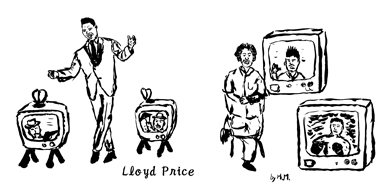

In my school days, I used to go to libraries and borrow CDs, which gave me pretty good music for free and some of which were little-known compilations. Their titles, "Roots of Rock" or "R&B All-time Hits" for example, are so ambiguous that you cannot figure out what kind of sorts or contents they mean. I happened to see the name Lloyd Price from CDs of such titles respectively. As for his songs, however, ones were heavy rhythm & blues with pianos and horns, and others were light pops with lyrics and choruses, and the difference made me guess they should not be sung by the same person.
Afterwords, one day I found the name Lloyd Price unexpectedly on TV. When I saw a documentary film of the Muhammad Ali's world championship bout with George Foreman in Kinshasa of Zaire (the present Democratic Republic of Kongo), he abruptly appeared as a promoter of James Brown's live held at the same time. As a man like electric-haired Don King, he was but the shadow of once a singer. I'm now convinced that he preferred to be a businessman rather than to be a star who sing songs. He seemed to be quite a unique personality among most contemporaries live their lives in the circuits of oldies show (He finally made a comeback as a singer ). Not only as a singer he worked hard as a businessman, and he also owned labels and produced some recordings of Wilson Pickett and Howard Tate.
Well, his songs can be heard on the compilations of bests and rares ("Lawdy!" and "Heavy Dreams") in Specialty years, and on the best albums ("The Millennium Collection" or "Greatest Hits(MCA)" ) in ABC-Paramount years. His signature song of Specialty is Lawdy Miss Clawdy featuring Dave Bartholomew's band and Fats Domino's piano, and it was followed up by the same typical New Orleans blues. These songs are commonly characterized in the hard shuffles of pomping pianos and heavy horns and punctuated back-beats (including strange I Yi Yi Gomen-a-Sai, which was composed by virtue of his stay in Japan during his army days). After serving in the army, he founded his own KRC label, and released Just Because distributed by ABC-Paramount (where he belonged later). It's catchy and nice though it leaves the hard groove of New Orleans. And then cheerful rock'n' rolls arrive, which are harmless enough to be aired on TV. There is a song titled Stack-a-Lee, originally a inherited folk blues, by Archibald of New Orleans, which is cool for the rolling style of piano and the jazzy way of singing (it can be heard on "Let the Good Times Roll", "The Carnival Day"). Price arranged it and cut a single Stagger Lee, a huge hit, whose lyrics were changed into a softer TV version because Dick Clark, the host of the program American Bandstand, was opposed to the harshness for the story of a man who lost in gambling and shot the opponent. Price's style of singing was hard-edged thus far, but in Personality or I'm Gonna Get Married or Where Were You on Our Wedding Day, he came to sing softer and the backing and chorus became sweeter.
Manias like me tend to be purists with a slogan like "Be true to your roots!" But purism is sometimes monotone and meddlesome. It's not bad to get something for a change and go to the next if you get weary, and it seemed to be what Lloyd Price was. It's good to listen joyfully to the songs even if they are temporary reminders and disappear like comets. Music itself is only a kind of hitch many people have. Whether or not you seek more music which reflects on your view of life. That depends on you. (2004/08/07)(2005/08/14)